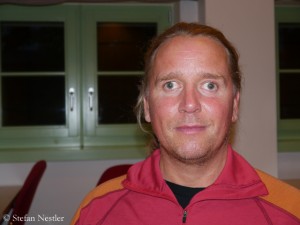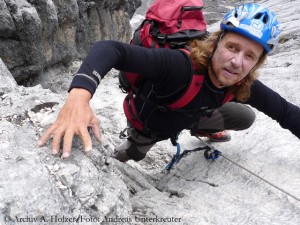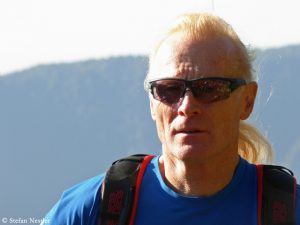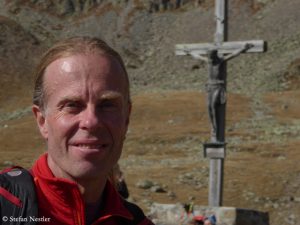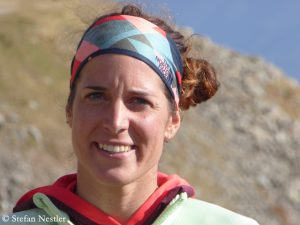Andy Holzer: “At 7500 meters everyone is disabled”
The blind can see, just in a different way. This is demonstrated by the Austrian Andy Holzer. The 47-year-old from Lienz in East Tyrol has been blind since birth. But that does not prevent him from rock climbing, ski touring or even mountaineering in the Himalayas. 16 August 1975 was a special day in Andy’s life: As a nine-year-old boy he was allowed for the first time to climb a rocky mountain together with his parents. After he had dragged himself for hours through the debris he turned to rock climbing and suddenly he regarded his father as climbing too slow. His mother couldn’t follow them. “I felt like someone had freed me from chains”, Andy recalled, as we recently met during the International Mountain Summit in Brixen.
Andy, the first question is probably always the same. How do you manage to climb a rock face without being able to see anything?
I don’t climb without seeing it. That would not work.
Please explain what you mean!
I generate the topographical details of a rock face with other sensations, for instance when I touch the grip, which later becomes my tread. This is simply intuitive climbing. Also seeing climbers train – of course in a protected environment – to climb blindly. These are completely different movement sequences. You don’t take a grip because you see it, but you grab for the place where your body’s center of gravity wants to go to. That’s the difference when you are climbing blindly. I habe been refining this technique for 25 years now. It’s no top climbing, no bid deal, but a lot of fun.
You must have a huge memory to combine all these sensations and informations in your brain to a 3-D-image of the rock face.
I am not even aware of this. I only notice that I have a much higher metabolism than my friends or other climbers. This is a very different deal of energy. I have to imagine much more, to invest more mental strength to climb on the same level as my seeing friends. The difference for me makes two, three or four degrees of difficulty. It’s just another dimension.
You are mostly climbing roped up with seeing partners. Are you also able to lead a route after having finished it with your mates?
For me that is the great motivation to climb steep mountains. I want to know: What does it look like? What do the seeing climbers see? Which shapes and structures has the mountain? I can not do it with my eyes. Not even with my ears. No matter how exactly you are listening into nature, you do not hear the mountain in its details. But I have my sense of touch. It is limited just to the point where my arm ends. I have to climb up the mountain to see him. It’s a huge motivation. To save it in memory is not strenuous but rather an emotional impulse, as if seeing people remember faces or sunsets.
Are you experiencing a rush of adrenaline like others when they hang in the wall, look down and are suddenly overwhelmed by what they are doing?
Many people confuse blindness with foolishness. Blindness is only the failure of one of five sensory nerves. You still have four, 80 percent of sensory perception are there. If I climb and a 600 meter deep abyss opens beneath my legs, I perceive the yawning depth that seems to pull me down. It’s tremendous. The knowledge is quite enough to get this feeling of exposure, the knowledge that the next step decides about fall or summit victory. There is no difference. Many people say to me: You are surely free from giddiness, because you do not look down. I reply: It’s a ferocious story to fall and see where it will end. But it’s much worse to fall into the dark, into uncertainty.
You have already climbed six of the “Seven Summits”, the highest peaks of all continents. Only Mount Everest is still missing. In 2001 it was already climbed by a blind man, Erik Weihenmayer from USA. You have already climbed together with him, as a “double-blind” rope team. Has he encouraged you to dare climb Everest too?
For me the “Seven Summits” are less a planned project. Until I had climbed the fourth of these summits I was not even aware of this collection. I climb about 200 mountains a year, not only here in the Alps. From Greenland to Antarctica, I’ve been everywhere. This “six of seven” were simply among these mountains. I’ve also left my traces on the two 8000ers Shishapangma and Cho Oyu, on which I, alas, couldn’t reach the summit. But I know what it feels like in Tibet, in Nepal, in the Himalayas.
Venture Everest? Everyone knows that Everest is the safest of 8000ers. It’s not an expedition but a journey. If I could now, aged 47, pack my bags and start together with my friends a trip to the highest mountain in the world, that would be very interesting. Others make a trip to Venice or to the Kitzsteinhorn (a mountain in Austria), and we just go to Everest. This is a cool idea. Because I think that anyone who does not feel tears in his eyes when he climbs up the Hillary Step and the last few meters to the highest point in the world, has no business being there. If there is no emotion on Everest, where else? Let’s see if it will happen. Maybe it will. But Everest is not my absolutely focused goal now.
So there is no concrete plan to try it next year? Also your biological clock is ticking. You know, it will be harder to climb in high altitude if you are 50 or older.
I’m totally aware of this fact. My friends are telling me, no problem, a 70- or 80-year-old has also climbed Everest. But that’s only a compliment of my friends to me. They all climb with headlamps. I am the only one who climbs in total darkness. This is a completely different thing, in a physical sense, concerning metabolism or body’s energy balance. At the age of 50 you have probably no business being there, and I’m probably already standing on the verge. For me as a blind Everest is just another mountain than for a seeing climber. We need not discuss this.
You tried to climb 8000ers twice. Was it for you another kind of self-experience climbing in this great altitude?
Up there the seeing and I converge further, because the speed is reduced. Going slower means for me as a blind person that I have for each step a few milliseconds more time to analyze whether I have to give more pressure on my crampon rear left or front right to stay in balance. Down here where the altitude does not matter I have to make my steps quickly one after another to keep pace with the others. In this case each step is like to do a lottery. In the long run it’s extremely exhausting. Compared to this it’s almost like a game if you have suddenly two seconds time for each step. The high altitude excites me that way because I feel good up there.
A Paralympic winner once told me that he didn’t like the term “disabled athletes”. Do you also feel pigeonholed when someone calls you like this?
No. I’m rarely called like this because I am not in competition. In addition: At 7500 meters above sea level everyone is disabled. I have never met anyone up there who was not disabled. And if we do rock climbing in the Dolomites and my seeing friend is not disabled, we have probably chosen the wrong route. In this case it was too easy, no challenge. We are climbing mountains just because we want to handicap ourselves, to escape the paved roads and to avoid tracks. That’s the great thing about mountaineering.
You also do skitouring.
In the last ten years I have spent at least hundred days per winter with skitouring, last winter even more. Snow suits me. In contrast to stones you can form snow by carving and balancing. Of course I had to learn special techniques. Again, the ears are extremely important. By the turns of my friend I immediately hear the inclination. It’s not necessary that he cautions me about an icy patch because I have heard it long since. Furthermore speed is important. If you are not fast enough you will sink into deep snow or in snow that is frozen at the top. I have intensively worked to get better during the last ten years so that now I can really enjoy it.
I skied down Shishapangma from 7100 meters, also from Mount McKinley or Mount Ararat in Turkey. Not because I want to be particularly cool, but because it’s a great relief for me. For this you don’t need eyes, it’s a matter of feeling. I also had to get used to the material. My skis are very short and very wide, so that the manoeuvrability is guaranteed.
All that sounds as if your life always is a workshop too.
Ha! I hope that everyone’s life is a workshop. Because if it’s not, you don’t further your personal development. I am constantly developing myself. What I am living day by day is my workshop of life. You have said well.



